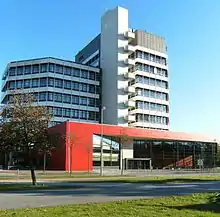University of Bremen
The University of Bremen (German Universität Bremen) is a public university in Bremen, Germany, with approximately 23,500 people from 115 countries.[2] It is one of 11 institutions which were successful in the category "Institutional Strategies" of the Excellence Initiative launched by the Federal Government and the Federal States in 2012.[3][4] The university was also successful in the categories "Graduate Schools" and "Clusters of Excellence" of the initiative.
Universität Bremen | |
| Type | Public |
|---|---|
| Established | 1971 |
| Budget | € 325.8 million[1]:37 |
| Rector | Bernd Scholz-Reiter |
Academic staff | 2,330[1]:27 |
Administrative staff | 1,185[1]:27 |
| Students | 19,173[1]:3 |
| Location | , |
| Campus | Urban |
| Website | www.uni-bremen.de |

Its commitment was rewarded with the title “Stadt der Wissenschaft 2005” (City of Science of 2005), which science, politics, business and culture won jointly for Bremen and Bremerhaven, by the Foundation for German Science (Stifterverband für die Deutsche Wissenschaft).
Some of the paths that were taken in the early days of the University, also referred to as the "Bremen model",[5] have since become characteristics of modern universities, such as interdisciplinary, explorative learning, social relevance to practice-oriented project studies which enjoy a high reputation in the academic world as well as in business and industry.
History

Though Bremen became a university city only recently, higher education in Bremen has a long tradition. The Bremen Latin School was upgraded to "Gymnasium Academicum" in 1584. In 1610 it was transformed into "Gymnasium Illustre". Under Napoleonic rule, in 1811 the institution of a "French-Bremen University" was considered. In 1971 the University of Bremen opened its doors.
The development of the University of Bremen can be divided up into steps of 10 to 12 years – first foundation, then restructuring, consolidation and profile building. At the beginning of the 1970s, the University was set up as a "science complex" in a city oriented towards trade and seafaring that had no experience with academia, particularly not with leftist professors. University, business and the public in the region did not move closer together until the 1980s, through the foundation of the natural science and engineering departments, co-operation with the newly founded Alfred Wegener Institute for Polar and Marine Research in Bremerhaven (1980), as well as the development of the co-located technology park (from 1988). Other important factors were the initial success in setting up collaborative research centres and in the acquisition of considerable of external funds. The mathematics professor Jürgen Timm, elected university rector in 1982, was largely responsible for this turnaround.
As a consequence, the University of Bremen improved in research rankings, gained national recognition, and established a number of endowment professorships. Research excellence and its interdisciplinary profile is reflected in the establishment of numerous research centers and programs funded by the German Research Foundation (DFG). These currently include eight collaborative research centers and the Research Center of Ocean Margins, one of only six national research centers of the DFG.[6]
From 1996 until 2001 the University of Bremen (along with six other universities in Germany) participated in a pilot scheme for structural reform of university administration, funded by the Volkswagen Foundation. This project improved the co-operation and communication between the university's administration, teaching and research units. With the realization of the "Laptop University" project, the University of Bremen became a leading university in the field of digital media education in Germany.
By 2000, after an organisational development process of three years in which the university set goals for the development of its profile, this trend was continued with the promotion of junior scientists in structured graduate programs, and staff development programs for the great number of early-stage researchers entering the university as junior professors. In teaching, there are comprehensive evaluations, more specific admission requirements, and improved completion rates for Bachelors and master's degrees.
Faculties
These are the twelve faculties into which the university is divided:
- Faculty 1: Physics/Electrical Engineering
- Faculty 2: Biology/Chemistry
- Faculty 3: Mathematics/Computer Science
- Faculty 4: Production Engineering - Mechanical Engineering & Process Engineering
- Faculty 5: Geosciences
- Faculty 6: Law
- Faculty 7: Business Studies and Economics
- Faculty 8: Social Sciences
- Faculty 9: Cultural Studies
- Faculty 10: Languages and Literary Studies
- Faculty 11: Human and Health Sciences
- Faculty 12: Pedagogy and Educational Sciences
Academics
Admission
Admission to University of Bremen is highly competitive with big differences in the admission rates between programs.[7] In the winter term 2017 the overall undergraduate admission rate was 16.2% with 24,000 applications for 3,900 places.[8]
Teaching and learning
The University of Bremen is a campus university which offers 118 different programs.[9] In 2016 it granted 2,028 baccalaureate degrees, 1,357 master's degrees, 303 doctoral degrees.[10] Each year the University of Bremen awards the Berninghausen Prize for excellent teaching.[11] The prize was started in 1992 and is considered to be the oldest teaching award at any German University.[12] Tuition is free for national and international students at the University of Bremen. There is, however, a semester contribution of approx. €300, which includes a ticket for public transportation in Bremen and parts of Lower Saxony.[13]
Research
The University of Bremen is a research university. It has 12 faculties, but focuses its research on 6 interdisciplinary high-profile areas. They are (1) marine, polar and climate research, (2) social change, social policy, and the state, (3) materials science and production engineering, (4) minds media machines (5) logistics and (6) health sciences.[14]
See also
| Wikimedia Commons has media related to Universität Bremen. |
Notes and references
- "Rechenschaftsbericht des Rektors: "Uni in Zahlen" 2016" (PDF) (in German). Rektor der Universität Bremen. Retrieved 21 April 2017. 3,4 MB
- Universität Bremen, Germany. "Facts and Figures". Universität Bremen. Retrieved 15 November 2016.
- "DFG, German Research Foundation - Institutional Strategies (2005-2017)". www.dfg.de. Retrieved 15 November 2016.
- Universität Bremen, Germany. "Excellent". Universität Bremen. Retrieved 15 November 2016.
- Universität Bremen, Germany. "Teaching and Studies". Universität Bremen. Retrieved 3 May 2017.
- "DFG Research Centres". Deutsche Forschungsgemeinschaft. Retrieved 10 November 2010.
- "Universität Bremen weiterhin beliebt: 33.000 Bewerbungen zum kommenden Wintersemester". nordbuzz.de (in German). 2 August 2017. Retrieved 11 September 2017.
- Universität Bremen, Germany. "Freie Studienplätze an der Universität Bremen". Universität Bremen (in German). Retrieved 11 September 2017.
- "Search for program". www.dbs.uni-bremen.de. Retrieved 11 September 2017.
- "Rechenschaftsbericht des Rektors: "Uni in Zahlen" 2016" (PDF). University of Bremen (in German). President of the University of Bremen. Retrieved 11 September 2017.
- Schröder, Sandra. "Preis für gute Lehre". Universität Bremen (in German). Retrieved 11 September 2017.
- Jorzik, Bettina (2010). "Ausgezeichnete Lehre!" Lehrpreise an Universitäten. Münster: Waxmann. p. 118. ISBN 9783830923046.
- Sekretariat für Studierende, Universität Bremen, Germany. "Re-registration and Semester Contribution". Universität Bremen. Retrieved 11 September 2017.
- Universität Bremen, Germany. "High-Profile Areas at the University of Bremen". Universität Bremen. Retrieved 11 September 2017.
- "Academic Ranking of World Universities". ShanghaiRanking.
- "QS World University Rankings". Quacquarelli Symonds Limited.
- "World University Rankings". THE Education Ltd.
External links
- University of Bremen Website (in German and English)